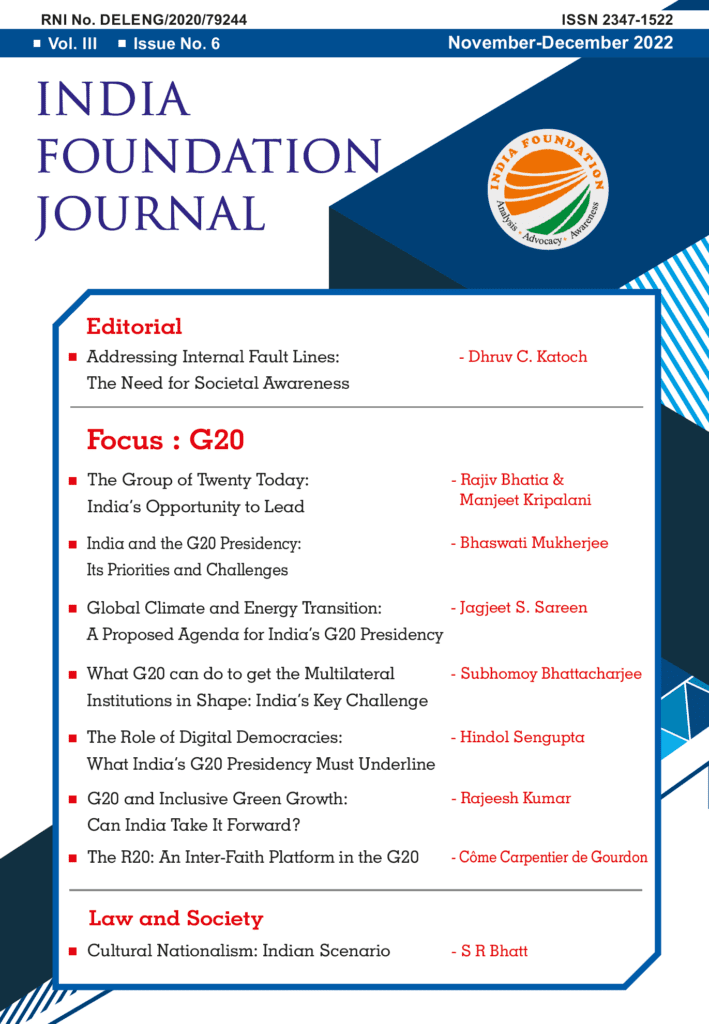Author: Alberto Cossu – 03/5/2023
The India Foundation is an independent research center committed to analyzing politics and India’s role on the international stage. It has headquarters in New Delhi. Its activities include organizing international events and publishing studies on the Indian subcontinent. The Foundation publishes a bi-monthly magazine (The India Foundation Journal). It handles political, economic, social, cultural, and religious issues with an agile scientific perspective and relies on authoritative scholars. The November-December issue questions the role India will have in the G20 of 2023 and what priorities it will give to the topics to discuss since it holds the presidency of this organization.
The two key concepts around which New Delhi’s commitment will revolve are the multilateralism strengthening and the expansion of digital democracy. About this point, India, the authors argue, can spend its reputation not only on the small group of 20 member countries but especially with emerging and developing countries that appreciate and recognize the contribution provided on an international dimension.
A few years ago, American geopolitics expert Robert D. Kaplan wrote in his book “The Revenge of Geography”: “As the United States and China become great rivals, India’s choices for international positioning may determine the course of geopolitics on the Eurasian continent in the 21st century.” In light of more recent events, we may say that India’s influence is transcending this geographic area to take on a more global level. The awareness of being a vital player in geopolitical balances, is gaining ground in the Indian political class led by Prime Minister Narendra Modi.
Thank to that awareness, India has exploited the ability to exercise full political sovereignty to make independent foreign policy choices in the national interest. Moreover, its natural geographical location places it at the center of the Indian Ocean and enhances its function as a hinge linking the Middle East and the Far East. An indispensable actor not be ignored. The global economic prospects for the next 2023, drawn by the IMF and the World Bank, are slowing down and negative for some countries. Clear signs of
a recession are emerging. India’s GDP grew by 8.7% in 2021, while the IMF’s projections for 2023 are 6.8%.
However, India is among the large economies that are growing the most and will likely be able to further benefit from policies to acquire energy resources at competitive prices compared to international competition in the future. In summary, India is increasingly making its economic and geopolitical weight felt. India has become the world’s fifth-largest economic power, surpassing the United Kingdom. It is part of SCO and BRICS and is expanding its relations both to the East, strengthening economic ties with Japan, the Middle East, and in particular with the Emirates, which is linked with by a strategic collaboration relationship in many sectors, including logistics aimed at opening an outlet to the Mediterranean. It has consolidated economic relations with Russia. Despite this has not compromised its relationship with the United States and China. All that said, the relations with China and Pakistan are not without friction. India, perhaps in a low-key manner, is also looking at Africa, where it competes with China in sectors such as ICT and health. Relations with Europe are still tepid, although it is one of the relevant markets for Indian product exports.
Creating a free trade area will take time before accomplishing. In this context, asking how India has accomplished all this and what opportunities and challenges face in the next presidency of the G20 assumes particular significance.
In July 2022, Indian democracy, despite many contradictions within it, as described by Amartya Sen in a recent essay, elected Draupadi Murmu, the first woman of tribal origin to hold such a position, as President of the Federation. The election sparked controversy, with some accusing the Modi government of using the fact to cover up policies of marginalization and discrimination against minorities. Nevertheless, India, like a few other countries in the world, demonstrates the ability to give an important signal to integrate ethnic minorities into a framework of great digital democracy capable of mobilizing almost one billion people for elections and providing services on advanced computer platforms.
The authors, particularly Subhomoy Bhattacharjie’s article “What G20 can do to Get the Multilateral Institution in Shape: India’s Key Challenge” and Hindol Segunpta’s “The Role of digital democracies: What India’s G20 presidency must underline,” agree that India must develop a strategy aimed at strengthening multilateral institutions and leveraging one of its main international assets, which is to be a digital democracy capable of providing developing countries, but not only them, with the tools to develop it. It is just a hint. In December 2022, the government will announce its priorities. Be sure, the Indian government will not deviate from the mentioned issues very much.
In conclusion, this is a valuable reading for those looking at the future of India and the role the country intends to play internationally, but also for the future of G20 governance. In the coming years will be entrusted to Brazil (2024) and South Africa (2025). These countries, which are part of BRICS along with India, will continue to promote their demands for strengthening multilateralism and changing the institutions representing it today.


Alberto Cossu, Senior Analyst at Vision & Global Trends. International Institute for Global Affairs
